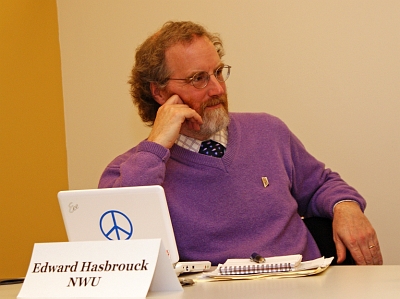Thursday, 21 January 2010
Why the NWU thinks the proposed Google Books settlement is unfair

[Left to right: Edward Hasbrouck (NWU), Sally Shannon (ASJA), Lynn Chu (Writers Reps), James Grimmelmann (NYLS), Paul Aiken (Authors Guild), Michael Capobianco (SFWA), Larry Goldbetter (moderator, NWU). Photo by kind permission of Bud Korotzer.]


[Photos by kind permission of Bud Korotzer (left) and Joly MacFie (right, from from video).]
Following are my opening remarks from yesterday’s information session in New York City for writers about the proposed Google Books settlement. I’ll be speaking at somewhat more length on the same topic as part of Friday’s workshop in Berkeley. Authors have until the end of the day next Thursday, 28 January 2010 (postmarked or online — you can’t opt out by e-mail, and Web site is unreliable, so snail-mail is preferable), to decide what to do about the proposal. Doing nothing is probably the worst choice.
The National Writers Union helped organize this event for writers and another on the same topic Friday in Berkeley because we think that the proposed Google Book settlement is a bad deal for working writers. Why is that? Let me count the ways:
(1) First, the money is grossly inadequate. Writers should realize that:
- As compensation for past infringement, there’s been a lot of talk about “$60 a book”. But that’s the total per book for all the “rightsholders”. For books in print, the entire amount will be paid to your publisher, and it will be up to your publisher to decide how much of it, if any, they think they are supposed to pass on to you. Authors may get only a small fraction of the $60, most of which is likely to go to print publishers. Authors’ shares will only be determined later, after it’s too late to opt out.
- There’s no guarantee how much you might get for future uses of your work. But better deals than the settlement are already available. If you own the rights, you can submit your book directly to Google through its “Partner Program”, and get a larger share of the revenue for the same uses by Google than if you remain in the settlement. Or you can have Amazon offer a Kindle edition. Or you can sell PDF’s on your own Web site, and keep 100% of the revenue.
(2) The second fundamental unfairness is the opt-out process in which authors who do nothing not only will get no money, but will irrevocably forfeit, through inaction, some rights and control over their work. Worse, anyone who does nothing will be bound by whatever the settlement is determined, after the fact, to mean. We can argue, as we have here, about what the settlement means. But the honest answer is that we don’t know, and the people on this stage aren’t the people who will decide. Inherent in remaining in the settlement is gambling on how the settlement will be interpreted, and allowing your future rights to your own work to be determined by people and procedures that have not yet been decided.
(3) Third, writers need to know that the proposed settlement would affect not just your relationship with Google, but your existing relationships with print publishers, overriding some of their terms, and subjecting them to interpretation and binding arbitration by players to be named later: the Book Rights Registry and the arbitrators. And this will happen, of course, in the context of the ongoing, across-the-board rights grab by those same publishers, who are making sweeping and bogus claims to exclusive ownership of e-book rights, and to owing only royalty percentages on e-book sales, even when authors never signed over e-book rights, or e-books are covered by a “subsidiary rights” clause with a much higher revenue share for the author. Assuming that print publishers make the same claims to e-book rights under the settlement that they have made in every other dispute with writers, what’s the guarantee that authors will get their fair share of the per-book payouts, rather than having most or all of that money go to print publishers?
[Follow-up: Audio podcast of the complete New York event, thanks to Joly MacFie and the Internet Society. Audio podcast of the Berkeley event. Video of New York event and streaming audio of both events. News and blog coverage: Publishers Weekly, Booksprung, suricattus, Flogging Babel, Open Book Alliance. If you come across other coverage or commentary, please leave a comment with a link.]
Link | Posted by Edward on Thursday, 21 January 2010, 11:25 (11:25 AM)Ed
I assume that the following segment, "The second fundamental unfairness is the "opt-out" process in which authors who do nothing not only will get no money, but will irrevocably forfeit, through inaction, some rights and control over their work" means that the opt-out is not the one used to Google, but instead is the one where the author did nothing, instead of explicitly telling Google to stand back by using those words.
Correct?
If not, I hope you will explain tomorrow night.
Louise
Posted by: Louise, Kensington CA, 21 January 2010, 13:11 ( 1:11 PM)The problem with the Google Partner Program is that if you look at the fine print, Google reserves the right to change the terms of the Partner Program at any time--without ever notifying members of the Partner Program. I imagine that sooner or later, the terms will be quietly aligned to ones more favorable to Google, possibly the same ones as in the Settlement.
Posted by: Frances Grimble, 30 January 2010, 15:39 ( 3:39 PM)